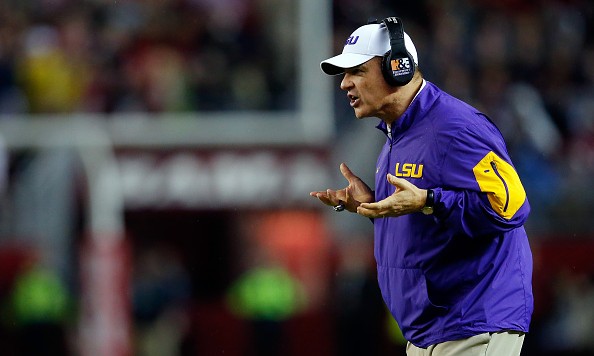By the nature of the profession, it’s almost never pretty when the end comes for a legendary college coach, or even the very good ones who build and define their programs. The Tom Osborne moment in the 1998 Orange Bowl is rare.
One need only to look at Gary Pinkel (a tumultuous season unlikely to end in a bowl bid) or Frank Beamer (retiring in the midst of his program’s continued downturn) to understand this axiom.
There’s much debate to be had about Les Miles’ job security at LSU; whether he deserves another year; if LSU would be foolish to let him go; or who would feasibly be better. For now, there’s plenty of emotional fodder, one imbued with the bitterness of three straight demoralizing losses.
The impression that lingers is wounded pride for an LSU team Ole Miss drubbed, 38-17, on a blustery Saturday afternoon in Oxford. Sure, Hugh Freeze once again proved his teams are capable of taking down a name school in the SEC, which — it should be noted — is the chief criticism of his in-state counterpart, Dan Mullen at Mississippi State. That’s not a significant enough sea change, in and of itself.
Instead, it’s about an LSU team which, amid rumors all week about Les Miles’ job status, came out and tripped over itself at every critical juncture. Many of the major valid criticisms of Miles during his Baton Rouge tenure have come home to roost this season, most especially during a second straight embarrassing effort.
LSU came out and committed 13 penalties, 10 in the first half, and coughed the ball up three times. If the Tigers were a team playing focused football to save their coach’s job, it was in effort only. The execution of the basics (running plays after timeouts, pre-snap infractions, special-teams tackling) has been lacking all season, with improvement and regression in equal measure since game one.
LSU has always been a heavily-penalized team under Miles. Indeed, many great college coaches have had highly-penalized teams (hello, Urban Meyer!), but LSU has stalled out in November because it still looks like a young team playing on the road in September.
The Tigers briefly made the Rebels tighten, forcing a 24-17 game midway through the third quarter. Make no mistake, it still wasn’t even as close as the final score. This marked not only a third straight loss, but the third consecutive game in which LSU trailed by three scores in the second half. For a team with the kind of talent (albeit young) that routinely wears the purple and gold, that won’t fly.
That brings us to the dwindling of perhaps Miles’ greatest coaching asset. I’ve been on the field with a prime vantage point when Les has led his team onto the gridiron for a handful of big games. It provided great insight into why he’s won 110 games over almost 11 seasons at LSU. He’s routinely overcome those execution errors and in-game coaching deficiencies by getting his players to max out not just for themselves, but also very specifically for him. I’ve often said of seeing those players’ faces during that pregame ritual that they might go to war if Les asked it of them right then and there.
Of course that’s modest hyperbole, but that kind of intensity was lacking in noted quantity on Saturday. It’s hard to say LSU full-out quit, but sans an ill-advised sideline fight, the Tigers were adrift and listless for 50-plus minutes on Saturday. Good luck getting LSU up for Texas A&M next weekend, even with John Chavis’ return to Tiger Stadium.
The reminders of LSU’s last coaching change by choice were everywhere. The three straight losses mark the first such streak for the program since 1999. Ditto for allowing 30 or more points in three consecutive games, a scathing indictment of Kevin Steele, whom Miles brought in to replace Chavis as defensive coordinator on short notice. Miles has built a hearty bedrock beneath him in Baton Rouge, no question. Yet anytime comparisons to the Gerry DiNardo era are tangible demerits, that’s a red flag.
For a sharp reminder of what now constitutes a failure at LSU, understand that DiNardo was canned at the end of a 7-15 two-season run, without any SEC West titles or New Year’s Day bowls during his five seasons. Saban followed, and Miles has sustained a high-level program for a decade. In that respect, he’s partly a victim of his own success. He’s mostly well-liked by the fan base and administrators alike, but two top-10 finishes since 2007 and a passing game that annually wastes five-star recruits keep gnawing at that goodwill.
Many national observers, some unaware of the particularly fickle dynamic between Les and the LSU community, were stunned by this past week’s news that he may be on his way out.
Saturday’s effort is Exhibit 1A for those who want him gone.
There’s no shame in losing to the behemoth that is Alabama under Saban, but back-to-back drubbings against Arkansas and Ole Miss? A stacked young roster and a potential No. 1 recruiting class might not even be able to bring Miles back from that.
If the onslaught in Oxford was a penultimate peek at the Les Miles era, it was an ugly one. It shouldn’t be a surprising one.

